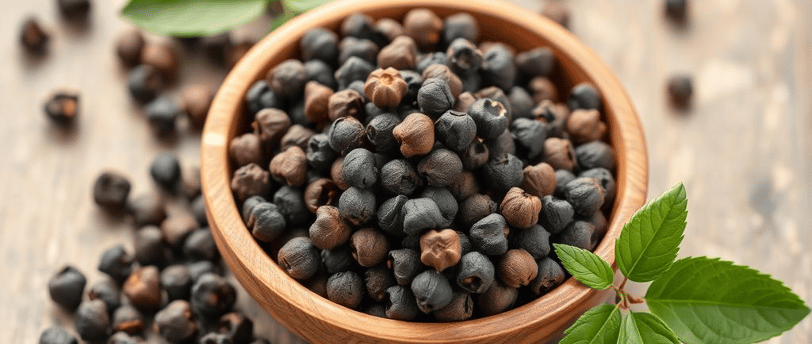Black Pepper for Heart Health: The Everyday Spice That Supports Cardiovascular Wellness
❤️HEART HEALTH


Black pepper isn't just a common seasoning in kitchens around the world; it carries a wealth of health benefits that have been celebrated in traditional medicine for centuries. Among its many properties, black pepper (Piper nigrum) is emerging as a potent ally in promoting cardiovascular wellness. In this article, we will explore the use of black pepper in supporting heart health—including available forms, recommended recipes, dosage, potential side effects, precautions, and the scientific basis behind its benefits.
Understanding Black Pepper's Heart Health Benefits
Black pepper is rich in piperine, the compound that gives it its distinct flavor and aroma. Recent studies reveal that piperine possesses numerous health benefits, including antioxidant, anti-inflammatory, and cholesterol-lowering properties. These attributes contribute to its positive impact on cardiovascular health.
Antioxidant Properties: Black pepper is loaded with antioxidants that combat oxidative stress. This stress can damage cells and lead to inflammation, a significant risk factor for heart diseases. Antioxidants help neutralize free radicals, thereby potentially reducing heart disease risk.
Anti-inflammatory Action: Chronic inflammation has been linked to various cardiovascular issues. Piperine helps mitigate inflammatory responses, which might assist in reducing the likelihood of heart diseases.
Cholesterol Management: Studies suggest that black pepper can positively influence cholesterol levels. By promoting the reduction of bad cholesterol (LDL) while potentially increasing good cholesterol (HDL), it helps maintain a healthy lipid profile.
Improved Blood Circulation: The presence of piperine may enhance circulation by dilating blood vessels, ensuring that oxygen and nutrients are effectively transported to vital organs, including the heart.
Forms Available
Black pepper can be consumed in various forms, making it accessible for incorporation into your daily routine. Here are some popular options:
Whole Black Peppercorns: The raw form of black pepper, which you can grind for fresh seasoning.
Ground Black Pepper: The most common form, readily available in grocery stores, ideal for cooking and seasoning.
Pepper Extract: For a more concentrated form of piperine, supplements containing pepper extract are available. These often come in capsule forms.
Pepper Essential Oil: This is less common but can be used for culinary and therapeutic purposes.
Pepper-based Spices: Blends that include black pepper alongside other spices offer additional flavor and health benefits.
Cooking with Black Pepper: Recipes
Incorporating black pepper into your diet can be delectable and easy. Here are some recipes to get you started:
1. Spicy Black Pepper Chicken
Ingredients:
1 pound chicken breast, diced
2 tablespoons black pepper, coarsely ground
3 cloves garlic, minced
1 tablespoon ginger, minced
2 tablespoons soy sauce
1 tablespoon olive oil
Fresh parsley for garnish
Instructions:
Heat olive oil in a skillet over medium heat and add garlic and ginger. Sauté for 1-2 minutes.
Add the chicken and black pepper to the skillet, cooking until the chicken is browned and cooked through.
Stir in soy sauce and cook for an additional 2 minutes.
Garnish with fresh parsley and serve with steamed vegetables.
2. Black Pepper Lemon Tea
Ingredients:
1 cup hot water
1 slice lemon
1/2 teaspoon ground black pepper
Honey to taste (optional)
Instructions:
Pour hot water over the lemon slice in a cup.
Stir in the black pepper and honey (if using).
Let steep for 5 minutes before sipping. This tea can help enhance metabolism while providing a refreshing taste.
Dosage and Supplements
While black pepper is safe for culinary uses, supplementation should be approached with caution. The recommended dosage for black pepper extract, which is higher in piperine, typically ranges from 5-20 mg of piperine daily, but it's essential to follow manufacturer's guidelines or consult a healthcare provider for personalized advice.
It's crucial to note that excessive consumption may lead to digestive disturbances. Moderation is key—most people can safely include black pepper as part of their everyday diet without adverse effects.
Side Effects and Precautions
While black pepper is generally regarded as safe for most individuals, there are some precautions to keep in mind:
Digestive Issues: High doses of black pepper can lead to irritation of the gastrointestinal tract, causing stomach discomfort or diarrhea.
Medication Interactions: Piperine can enhance the bioavailability of certain drugs by influencing their metabolism in the liver. This can either amplify effects or lead to toxicities of specific medications. Always consult a healthcare professional before starting supplements, especially if you're on medication.
Pregnancy and Breastfeeding: Pregnant or breastfeeding women should consult their healthcare provider before significantly increasing black pepper intake, as high doses may not be advisable.
The Scientific Basis Behind the Benefits
Numerous studies support the heart-health benefits of black pepper. A landmark study published in the Journal of Medicinal Food highlighted piperine's potential to lower cholesterol levels and mitigate the harmful effects of oxidative stress. Additionally, research published in the International Journal of Pharmaceutics emphasized piperine's ability to improve bioavailability, which may enhance the efficacy of other compounds beneficial for cardiovascular health, such as turmeric.
The combination of these studies represents a growing scientific foundation that may endorse the inclusion of black pepper for heart health.
Conclusion
Incorporating black pepper into your diet is an easy and flavorful way to potentially enhance your cardiovascular health. With its antioxidant, anti-inflammatory, and cholesterol-lowering properties, this everyday spice offers remarkable benefits worth considering. However, moderation is essential, and individuals should listen to their bodies and consult with healthcare professionals when necessary. So, next time you reach for that pepper shaker, remember that you're not just adding flavor but also supporting your heart.
